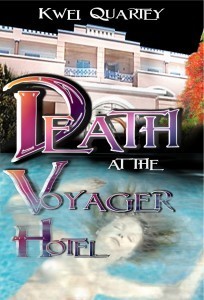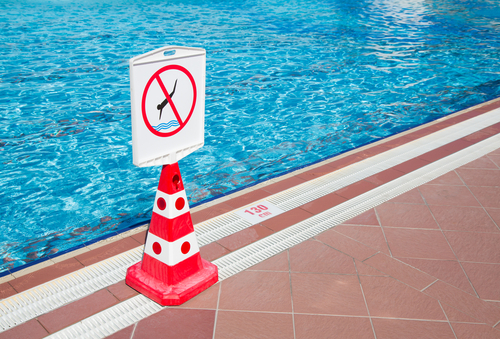Kwei Quartey's Blog, page 14
August 1, 2013
UPDATE ON “DEATH AT THE VOYAGER HOTEL”
D@TVH went on Nook today. The other sites where it’s available are Amazon.com and Smashwords.com. Nook is Barnes & Noble’s e-reader and e-bookstore, just as Kindle is Amazon’s e-reader and e-bookstore. However, you need neither a Kindle e-reader to read Kindle books, nor a Nook e-reader to read Nook books. As mentioned before, there is a free app for both Kindle and Nook that you can use to download the novella to iPad, iPhone/iPod Touch, Android, PC, Mac, or other compatible device. The novella will soon go on Kobo as well.
Although anyone can self-publish to Kindle or Nook etc., the uploading of a book from the computer to such a platform means sticking to some stringent technical rules to ensure that the text comes out right–which is why I had a professional do it! I call the plumber for the plumbing, an electrician for the electricity, and Ellie Searl for my e-publishing. Regardless of which platform you choose, D@TVH is the same with very minor differences. It happens to look the best on Kindle because of some esthetic flourishes that were more easily placed there than on the other platforms. However and wherever you read it, enjoy!
Death at the Voyager Hotel was always meant to be an e-book, first and foremost. I’ve been asked if it will also be published in paper. Yes, but probably not in the United States. The first to express interest in the novella as a paper book is a Ghanaian company.
July 30, 2013
“DEATH AT THE VOYAGER HOTEL” COMES TO KINDLE
As of July 30, 2013, the e-novella Death at the Voyager Hotel became available on Amazon’s Kindle. If you don’t have a Kindle, don’t worry. You can still read it by using the Kindle Cloud Reader, which will make it available on your phone, tablet of computer.
The novella is also on Smashwords, which also allows you to download the novella to multiple platforms.
Death at the Voyager will likely come to the NOOK and Kobo on July 31.
July 3, 2013
SWIMMING SAFETY
The previous blogs have talked about my upcoming e-novella, DEATH AT THE VOYAGER HOTEL and how it’s based on an idea sparked by the tragic death of Phylicia Moore, found dead in an Accra hotel pool in 2007. Although very few people outside of the investigators and Phylicia’s parents know what really happened, the case reminds us that drowning is a tragic cause of death that is often preventable. According to the CDC, about ten people die every day from unintentional drowning. Of these, two are children aged 14 or younger. In the United States, drowning ranks fifth among the leading causes of death by unintentional injury.
As a kid, I learned not only how to swim, but also how to maintain a healthy respect for the potential danger that bodies of water can pose. In other words, enjoy yourself, but be sensible and careful. During childhood, I witnessed two situations of near drowning, one at a swimming pool, the other in the ocean when two strong swimmers found themselves being pulled farther and farther out by a notorious riptide in the Atlantic.
Summer 2013 has arrived and this is the swimming season, especially for children. Parents should exercise care and common sense and pass those along on to their kids. Here are some tips for swimming safety, with a disclaimer that this does not purport to deal with every single issue on the topic. A more comprehensive treatment of swimming safety and unintentional drowning can be found in this article.
Learn: If you don’t know how to swim, it’s never too late. Although city and county funding has dwindled in many places, there are still YMCA and city park facilities that offer swimming lessons for both children and adults. The earlier you can start your kids getting used to a swimming pool, the better.
Make swimming a family activity: it’s a good idea for parents to get in the pool with their kids to practice swimming together. Nothing bonds more than a parent helping his/her child to practice a stroke. The CDC recommends that you remain close enough to touch preschool children when they’re in the water, and not allow older children to swim alone or without adult supervision.
Backyard pools: if you’re lucky enough to have one of these, don’t let it pose a danger, especially if you have small children. There is nothing more heartbreaking than stories of children who were within sight one minute and drowned in the backyard pool the next. Install a fence at least four feet tall all the way around the pool with a self-closing, self-latching gate. Note also that for very small children, drowning in the bathtub or even a bucket is a real danger.
Obey warning signs: beach signs are posted for swimmers’ safety and benefit. Ignoring or disobeying them can cost a life.
Swimming pools are a completely different environment from the ocean, but pool signs are just as important to be heeded.
I’ve sometimes noticed parents relaxing some distance from the pool sunbathing, chatting, eating, or drinking obliviously as their teenagers run around the edge of the pool engaging in dangerous horseplay and diving where they should not.
5. Don’t drink and swim: Among adolescents and adults, alcohol use is involved in up to 70% of deaths associated with water recreation. Alcohol influences balance, coordination, and judgment, and its effects are heightened by sun exposure and heat.
6. Protect your skin: you may love the sun, but it doesn’t love you. Ultraviolet rays cause skin damage (read wrinkled and/or leathery skin), skin cancer, and sunburn that can be so severe as to lead to a visit to an emergency room or urgent care center. Use a high quality sunblock and reapply frequently while at the beach or around the pool. Getting suntanned or sunburned is not a badge of honor. No matter your skin shade, just be happy with it and stop trying to get darker.
May 30, 2013
SNEAK PEEK AT “DEATH AT THE VOYAGER HOTEL”
For a preview of the novella Death at the Voyager Hotel, check out Hometown-pasadena.com to read the prologue.
May 28, 2013
HOMETOWN PASADENA
Pasadena has been home for me for about eight years, although I have lived in southern California much longer than that. Besides myself, the one other mystery writer that I know of who lives in Pasadena is Naomi Hirahara. Dianne Emley used to live in here as well, but has now moved elsewhere in California. Both women are prolific bestselling authors. We episodically bump into each other at book events.
In a city as diverse as this, there’s lots to do, and you can find out how, when and where by reading a terrific online publication called Hometown Pasadena (HP). Based on the bestselling guide book of the same name, it’s an online magazine that promotes everything in Pasadena from Chef Claud Beltran’s Gumbo Fest and to San Gabriel Valley’s treasure trove of home and garden tours.
In a section called “Creative Types,” HP interviews business people, artists, and authors; and in “Write Here,” HP supports local poets and fiction writers. Colleen Dunn Bates is HP’s creator as well as a publisher at Prospect Park Books , which published Hirahara’s novels Strawberry Yellow and the September 2013 release, Blood Hina.
Kat Ward, senior editor at HP and the author of Amy’s Own, invited me to contribute a piece to HP, and I have offered the prologue to my upcoming e-novella, DEATH AT THE VOYAGER HOTEL, which will be in the Thursday May 30 edition. Before that, there’s a short introduction and interview about a feature of the e-novella that I’m calling “Highly Personalized Links,” or HPLs. Curious? Read about it here.
May 17, 2013
DYING FOR A SWIM
THE BACKGROUND TO THE E-NOVELLA, DEATH AT THE VOYAGER HOTEL
The Voyager Hotel in Accra is located in the busy central Tudu district. It’s a hub of trade and business, and also where hundreds of homeless adults and children sleep along the sidewalks at night.

Tudu Road in Accra
Early on a March morning in 2013, a young American woman called Heather Peterson was found dead in the Voyager Hotel swimming pool. Heather, from Portland, Oregon, had worked as a volunteer teachers’ assistant at an urban school in Accra called High Street Academy, which catered to needy, eight- to fifteen-year-old children, particularly from the nearby neighborhood of Jamestown.

The lighthouse at Jamestown
Deemed an accident, the drowning death was declared an accident due to swimming while intoxicated, as indicated by Heather’s high postmortem blood alcohol levels. But this conclusion raised many questions. Heather had been an expert swimming instructor. How could she have drowned in six feet of water? Why would she have gotten so drunk when she had indulged in alcohol very little and no one had ever seen her inebriated. What really happened to Heather?
That’s the background to my upcoming e-novella, Death at the Voyager Hotel. It’s fiction, but the story that triggered it is real. Last year, I stumbled upon the mysterious and haunting case of Phylicia Moore.
In April 2007, Phylicia was an eighteen-year-old honor student at Teaneck High School, NJ, who planned to attend the Columbia School of Journalism. She had saved up for a two-week class trip to Ghana, the purpose of which was to take school supplies to Ghanaian schoolchildren and an AIDS orphanage. The excursion chaperones’ words of reassurance to Phylicia’s parents Lola and Douglas Moore before the trip, “Don’t worry — we’ll take good care of her,” were to prove fateful, because Phylicia would never return home alive. In fact, after arrival in Accra with her schoolmates, she had less than twenty-four hours to live.
The Circumstances The school group checked into the First Choice Lodge, which appears on the Internet to be a decent-enough hotel. Typical of teenagers, the students wasted no time getting to the pool to horse around and have fun. Phylicia was at poolside, and according to one version of the story, around 10:30 p.m. she told the chaperones that she was going to her room to change into her swimsuit. About eleven hours later, she was found dead at the bottom of the pool clad in her bathing costume underneath a tank top and shorts, but without her shoes. What had happened to her during that interval was a mystery that could flummox the very best of detectives in fiction or real life.
Presumably, when Phylicia went to her room to change into her bathing suit, she had intended to return immediately to the pool to join her friends. It was reported that at least some of her schoolmates were up until the wee hours of the morning while the chaperones went to bed. How is it that no one – neither the students nor the chaperones – thought to check up on Phylicia when they realized she hadn’t returned? Even more dumfounding, by at the most 8 o’clock the following morning, how could no one have noticed Phylicia’s absence, and how is it possible she was not found in the pool before about 9:30? Didn’t the students and chaperones have events or excursions planned for the day? Didn’t they go down for breakfast, at which point someone would have asked, “Where’s Phylicia?” Not a single hotel guest or a pool-cleaner or other hotel personnel went by the pool during the course of the morning? Hotels in Ghana are no different from others all over the world – they start the day early.
The Investigation
The crucial question is what took place between 10:30 that night and eleven hours later. The elephant in the room was expressed in a Youtube video by Douglas Moore, who asserts with the anguish of a father whose daughter has been snatched away: “…Someone put her in that pool and made it look like she drowned.” But an autopsy conducted in Ghana concluded that Phylicia had “accidentally drowned” and that no signs of foul play were present. In the video, the Moores’ attorney, Nancy Lucianna, states that another autopsy done after the Phylicia’s body was returned to the U.S. concluded that she had not been in the water long – certainly not as long as eight to ten hours and perhaps only one or two.
That doesn’t tell us enough, however. Even more important is whether swimming pool water was found in Phylicia’s lungs, an indication of drowning as the immediate cause of death. [Interestingly, the absence of water in the lungs of a drowned person does not always prove that death was not due to drowning (i.e. the body was dumped postmortem) because laryngospasm during submersion may prevent a lot of water entering the lungs.] Toxicology studies done in Ghana and repeated in the U.S. were negative, i.e., no suggestion that Phylicia ingested any significant alcohol or other drug. According to Nancy Lucianna, Ghanaian officials discarded Phylicia’s clothes, “because they didn’t think it was something that was important.” That’s another odd angle to the story.
In an effort aided by Rep. Steve Rothman, D-NJ, Lola and Douglas Moore tried to enlist the assistance of the FBI. Then U.S. Ambassador to Ghana Pamela E. Bridgewater let them know that Ron Nolan, FBI’s legal attache assigned to Lagos, Nigeria, would travel to Ghana to serve as a liaison to a task force formed by Ghanaian authorities to review Moore’s death. That is not the same as a formal FBI investigation. However, Nancy Lucianna said in the video, “we do know that the FBI has followed all the leads in Ghana to the present date, and they are focusing their attention on the Teaneck High School students…” What that meant exactly isn’t clear.
There were also accusations leveled that because Phylicia was black, much less attention was given to her case than to that of blond Natalee Holloway, for example. This has been called the “Missing White Woman Syndrome.”
The conclusions
The default assumption in drowning cases is that an accident has occurred. One reason could be that swimming is almost by definition associated with fun and recreation, not homicide or suicide, but as suggested in this ABC feature, 20 percent of supposedly accidental drownings might be homicides missed by law enforcement. Andrea Zafares, lead trainer for the Alameda County Sheriff’s Dive Recovery Team, emphasizes in interviews and written papers that a drowning case may not actually be the accident it may initially seem. This may have been the situation with Phylicia Moore, in that Ghanaian authorities presupposed that she had drowned by accident and did not pursue an exhaustive criminal investigation.
The denouement
Nancy Lucianna has informed me that the Phylicia Moore case has now been solved, but she could not provide me with the details without the Moores’ consent. Obviously, they may wish no further publicity on the matter, which is understandable. In Death at the Voyager Hotel, one woman, Paula Djan, was steadfast in her belief that Heather Peterson did not drown by accident, and she stuck to her guns until the true culprit was found. In the end, perhaps that’s what happened in the Phylicia Moore case. Someone persevered until the truth was uncovered. Whatever did happen to Lola and Douglas Moore’s daughter, it’s a heart-wrenching story of a promising young woman whose life was abruptly and brutally cut too short and too soon.
DEATH AT THE VOYAGER HOTEL – THE E-NOVELLA
Death at the Voyager Hotel, my new e-novella, is scheduled to come online in August 2013. It will be available on several devices including your computer, cell phone, and e-reader, e.g. the Kindle and Nook.
In Ghana‘s cosmopolitan capital of Accra, the Voyager Hotel is widely known as a medium-priced, well-run lodging perfectly suited to cash-strapped tourists. But one early March morning, it gains a notoriety it would rather not have. Hotel guest Heather Peterson, a beautiful, young Oregonian teacher, is found dead at the bottom of the hotel’s pool.

Cover artwork by Ellie Searl*
The police authorities deem it an accidental drowning, but that raises troubling questions. Heather was a strong swimmer. How could she have drowned in six feet of water?
Paula Djan, principal of the urban school at which Heather was a volunteer, suspects foul play and begins to dig around. As she discovers an increasing number of suspects, she encounters hostility from police investigators, who take a dim view of her snooping. But much more than stepping on a few toes, Paula may be headed down a dangerous path where the killer lies in wait with every intention of making her the second victim at the Voyager.
As a novella, the story runs about 100 pages – good for a quick read on a plane flight or on a quiet evening at home. It is based loosely on a true story, which I’ll tell you about in my next blog.
April 6, 2013
BEN AFFLECK, THE CONGO, YOU, AND YOUR iPHONE
What do you….
your beloved smartphone….
 Ben Affleck, and….
Ben Affleck, and….
 the Democratic Republic of the Congo
the Democratic Republic of the Congo
have to do with each other?
Maybe you used your iPhone to look up Argo, the Oscar-winning film directed by and starring Ben Affleck…
Beyond that, are you stuck? Read about the surprising connection here.
February 23, 2013
QUARTEY GOES TO SOHO
DEALS
Publishers Marketplace – February 21, 2013 – Kwei Quartey’s MURDER AT CAPE THREE POINTS, a detective Darko mystery to Juliet Grames at Soho Press in a two book deal by agent Marly Rusoff at Marly Rusoff & Associates (world English)
That’s the official announcement heralding my new publisher, Soho Press. The first of the two novels in the deal will be MURDER AT CAPE THREE POINTS. The editing process will begin shortly and publication is targeted for March 2014. Not to worry, it will be 2014 before you realize.
Soho Press, founded in 1986 and located in the heart of downtown Manhattan (actually not very far from where I lived in New York), is an independent publisher of literary fiction. One of its imprints is Soho Crime, which publishes beautifully produced, culturally rich crime novels in settings all over the world. Almost all of the books are serial novels set in particular countries and/or cultures. This is Soho Crime’s specialty, making it a very good home for the Darko Dawson series.
Soho Crime’s long list of authors includes Cara Black, a bestselling writer known for her female, Paris-based private investigator, Aimée Léduc. Colin Cotterill, who lives in Southeast Asia, writes the award-winning Dr. Siri mystery series set in Laos. In 2011, Soho Crime published the blockbuster The Boy in the Suitcase by Lene Kaaberbøl and Agnete Friis, whose Nina Borg series is set in Denmark. Stuart Neville‘s The Ghosts of Belfast won him the Los Angeles Times Book Prize. Henry Chang‘s Jack Yu mystery series is set in New York’s Chinatown, where Chang grew up.
It’s gratifying to now have Detective Darko contributing to the rich mix of murder mystery settings that makes Soho Crime so special.
February 16, 2013
WILL THE NEXT POPE BE AFRICAN?
The startling resignation of Pope Benedict XVI is the first since 1415, when Pope Gregory XII stepped down to help resolve a schism in the Catholic Church.

Cardinal Peter Turkson (courtesy http://rejtelyekszigete.blogger.hu)
Well, the papacy must go on, so the question is, who’s next? Who will fill the vacancy? Several candidates are in the running, among them Ghanaian Cardinal Peter Turkson. But this potential choice is already causing some controversy.









